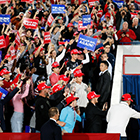
A Fractured Coalition
A roundtable on the 2024 election.


A roundtable on the 2024 election.

A roundtable on how COVID-19 has changed American universities.

Today, inequality—especially racial inequality—is not only produced through the job market but through people’s ability to hustle.

For-profit colleges use a unique model of recruitment to appeal to potential students who are short on time.

“Having it all” is not a feminist theory of change.

Higher education can’t solve inequality, but the debate about free college tuition does something extremely valuable. It reintroduces the concept of public good to education discourse.

According to Fortune magazine, Starbucks will “encourage baristas to discuss race relations with customers”. Starbucks’ media page says that a series of “racially charged tragedies” sparked the initiative “Race Together”. The initiative comes with stickers: [Race Together] may also engage customers in conversation …

Not so long ago, the social contract between workers, government, and employers made college a calculable bet. We built a university system for the way we worked. What happens to college when that social contract is broken—when we work not just differently but for less? And what if the crisis in higher education is related to the broader failures that have left so many workers struggling?